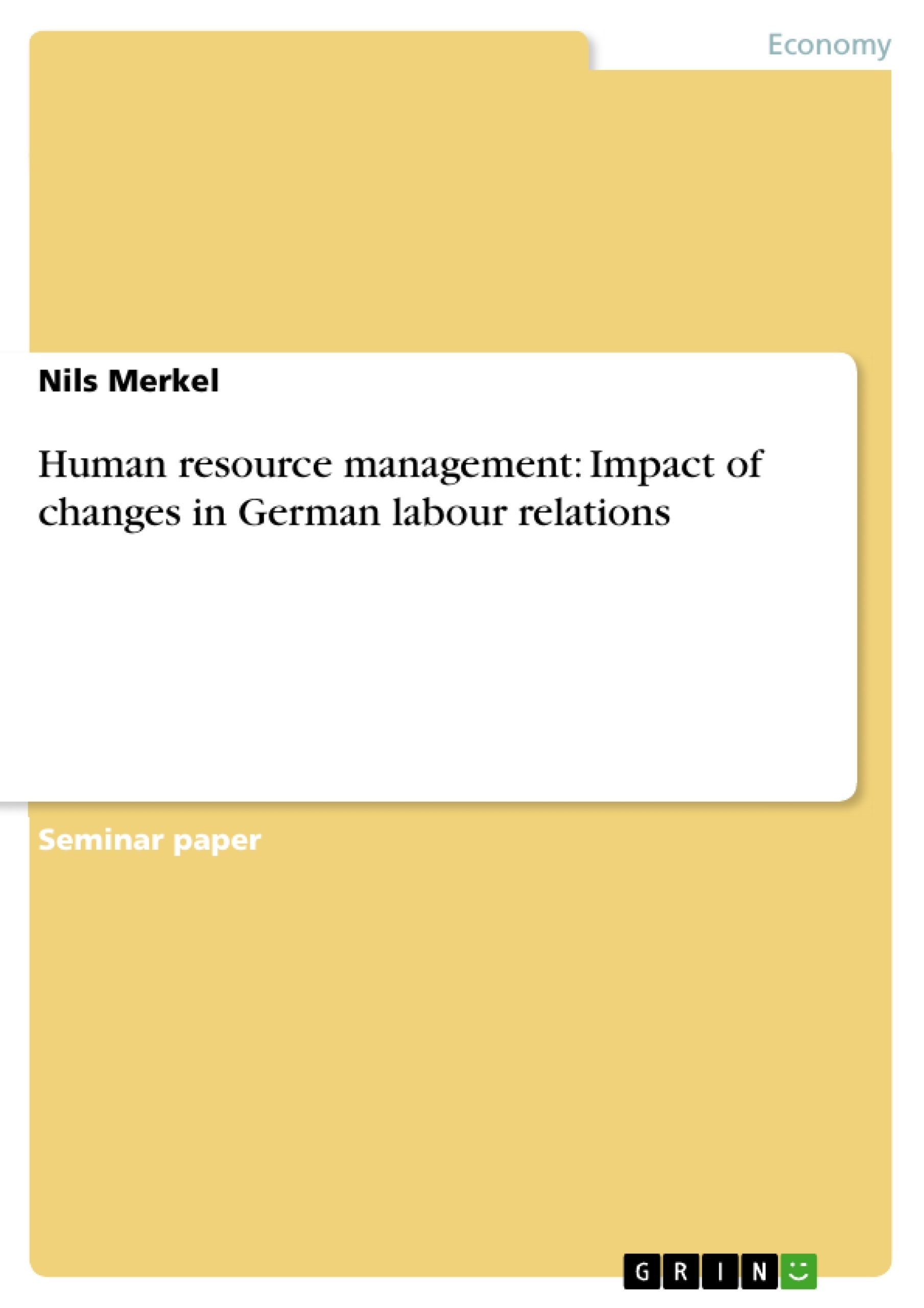Excerpt
Content
1. Introduction
2. General labour relations in Germany
2.1. Labour union “Gewerkschaft”
2.2. Works Concil “Betriebsrat”
2.3. Employers’ Association “Arbeitgeberverband”
3. Present Situation in Germany – Problems and Changes
3.1. Decreasing importance of the labour union
3.2. The “Ich AG”
3.3. Temporary employment agencies and private labour agencies
3.4. Works Councils
3.5. Relocation abroad
3.6. Rescue Companies and “5000*5000”
4. Consequences for Human Resource Departments
5. Opinion about the future
1. Introduction
In this paper I will first of all give an overview about the general labour relations between employers and employees and the intermediary institutions especially for Germany. Furthermore reasons of the radical changes in this relation will be worked out in chapter 3. The main focus is set on the high unemployment rate and its impacts concerning the position of the employers. Finally there will be a discussion how these changes will impact upon the function of Human Resource Departments in large and medium size corporations and a statement about the future development.
2. General Labour relations in Germany
Companies operating in Germany necessarily deal with labour unions (“Gewerkschaften”) and works councils (“Betriebsräte”). (www.shrm.org/global/publications/ baker/1098glob/germ.htm)
The interest of the contractors are mostly represented by the employers’ association.
To get a clear understanding about the differences between these three important columns in German labour relation the definitions are given in the following passage.
2.1. Labour union “Gewerkschaft”
“An association of workers united as a single, representative entity for the purpose of improving the workers' economic status and working conditions through collective bargaining with employers. Also known as "unions". There are two types: the horizontal union, in which all members share a common skill, and the vertical union, composed of workers from across the same industry.
The group of employees wanting to form a union usually need a set amount of signatures, this amount is dependent on the jurisdiction it wants to form in. If enough signatures are obtained there is a vote by all employees and if passed the union will negotiate on their behalf with the employers.” (http://www.answers.com/topic/trade-union)
In Germany a labour union represents the employees of a whole industry. For example, “IG Metall” claims to represent employees working in the metal industry.
(www.shrm.org/global/publications/ baker/1098glob/germ.htm)
2.1. Work council “Betriebsrat”
In contrast, a works council is the elected representative of the employees of a specific business unit. Its duty is to represent their specific rights and interests. A works council does not represent executive employees. (www.shrm.org/global/publications/ baker/1098glob/germ.htm)
German law does not require that the employees elect a works council. Likewise, it is not the employer's duty to organise a work council's election. According to the German Labour Management Relations Act (“LMRA”), the establishment of a works council requires a business unit (“Betrieb”) with at least five permanent employees over 18 years of age. An election of a works council is organised by an election committee which, in turn, is elected by the general assembly of employees. The election committee, consisting of three employees, must organise the works council election. The employer must refrain from any action which could impede or interfere with the formation of a works council. Election committee members are entitled to paid time off, as may be necessary, to perform their duties. Further, they are protected against termination of employment.
(www.shrm.org/global/publications/ baker/1098glob/germ.htm)
2.3. Employers’ association “Arbeitgeberverband”
An employers’ association is a merger of employers out of the same industry in order to represent their interests. Many regional associations are often connected together to an umbrella association. (de.wikipedia.org/wiki/Arbeitgeberverband)
One of the most important issues is to work out labour agreements with the labour unions of the particular industry. This agreement regulates mainly the working hours as well as the minimum wages. (www.brockhaus.de)
3. Present Situation in Germany – Problems and Changes
3.1. Decreasing importance of the labour union
The big German labour union (DGB) which was founded in 1849 is fighting now for more than 150 year for the rights of the employees.
The DGB now consists of the following members who operate in the several branches:
- IG-Bauen-Agrar und Umwelt
- IG-Bergbau Chemie
- Gewerschaft Erziehung und Wissenschaft
- IG-Metall
- Gewerkschaft Nahrung Genuß Gaststädten
- Gewerkschaft der Polizei
- Tanset
- Verdi
(http://www.dgb.de/sprachen/englisch/gewerkschaften.htm)
Great effort has been made in the last centuries to improve the conditions of employment and German employees reached one of the highest standards and minimum wages in the world. Through hard negotiations and even strikes the DGB used their power to reach their targets. As a representative of millions of workers they even influenced the political development. (www.dgb.de)
Employees seem to get more and more into a weaker position concerning the negotiations about the working conditions. The question to be answered is why this especially in the last 20 years got more and more obvious.
One of the most important reasons can be found in the steady increasing unemployment-rate. From earlier 0,7 % in 1970 the rate rose to even 12,7 % in 1997. To illustrate this development a figure is given in the following.
[...]
- Quote paper
- Nils Merkel (Author), 2005, Human resource management: Impact of changes in German labour relations, Munich, GRIN Verlag, https://www.grin.com/document/56782
Publish now - it's free






















Comments